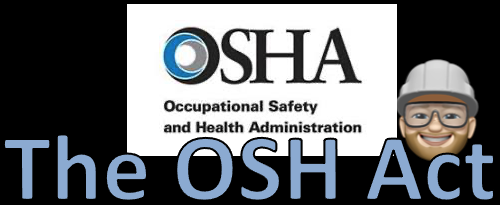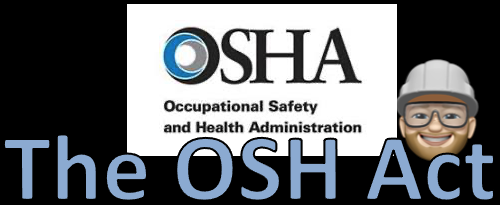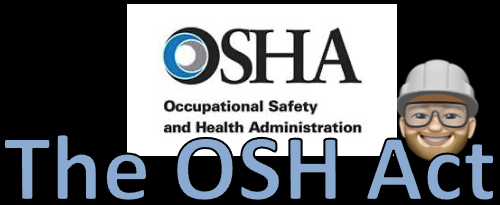
OSH Act – The General Duties Clause
Section 5 of the Occupational Safety and Health Act (OSH Act) is probably the most well-known part of the OSH Act. When the Occupational Health & Safety Administration (OSHA) does not have a specific standard or a necessary part of a standard to the site, they will use the General Duty Clause (OSH Act (5)(a)(1)). Another way to look at the General Duty Clause is the mother of all catch-alls!
The General Duty Clause in the OSH Act is actually titled Section 5 – Duties and reads,
“(a) Each employer —
(1) shall furnish to each of his employee’s employment and a place of employment which are free from recognized hazards that are causing or are likely to cause death or serious physical harm to his employees;
(2) shall comply with occupational safety and health standards promulgated under this Act.
(b) Each employee shall comply with occupational safety and health standards and all rules, regulations, and orders issued pursuant to this Act which are applicable to his own actions and conduct. (OSHA, 1970)”
Just to clarify 5(a)(1): who can “recognize” a hazard? Anyone! The employer, employee, insurance carrier, consultant, anyone. Once the employer is informed of a hazard, it then becomes their duty to correct it as soon as possible.
For 5(a)(2) and (b) the employer shall (will) comply with occupational safety and health standards as adopted AND their employees must also comply with the same standards. So what does this mean? It means that all employers AND employees must play by the same set of rules.
If employers do not follow the rules, then they are subject to fines and penalties from OSHA. If employees do not follow the rules, they are subject to disciplinary action, including termination of their employment.
Does OSHA issue citations to employees?
The short answer is NO, but if you stopped reading the OSH Act at 5(b), you might think so. However, in Section 9 of the OSH Act (written about later) clearly limits OSHA’s ability to cite only the employer. You can also find a Letter of Interpretation (LOI) here: https://www.osha.gov/laws-regs/standardinterpretations/1990-10-05
Is the employer required to issue disciplinary action?
No and care should be taken when disciplinary action is taken. In fact, an OSHA administrator gave a speech a 2018 and stated, “Employee misconduct is NOT a root cause. An employee not following a rule might certainly be a cause, but you can’t end your investigation there. What part of your safety and health program failed to catch this, tolerated the deviation, or perhaps even condoned it?”
Make sure that your safety culture isn’t causing or allowing your employees to work unsafely. Site and work inspections should be conducted to ensure all procedures are being followed. When deficiencies are noted, they should be documented and the affected employees should have documented retraining. Then if the problem persists, then disciplinary action should be considered with the help of your Human Resources Department.
Remember, as outlined in the ISHN research conducted in 2017, “found that 69 percent want supervisors (usually the ones at the sharp end of discipline confrontations) to be more safety leaders, not just enforcers. Almost all readers (97 percent) want supervisors to inspire and influence worker engagement. Nine in ten (90 percent) say supervisors must give positive reinforcement to employees. Less than one-third (32 percent) say it’s important to develop supervisors’ abilities to deal with resistant, confrontational or apathetic workers. Most of those who do want aggressive discipline tactics are executive managers, not safety professionals – evidence of an old-fashioned, top-down, command and control culture.”(ISNH, 2018)
References:
ISNH, (2018), Employee safety discipline ain’t what it used to be. The focus is on “what failed?” not “who failed?” https://www.ishn.com/articles/109664-employee-safety-discipline-aint-what-it-used-to-be
OSHA. (1970). OSH Act of 1970. https://www.osha.gov/laws-regs/oshact/completeosha



